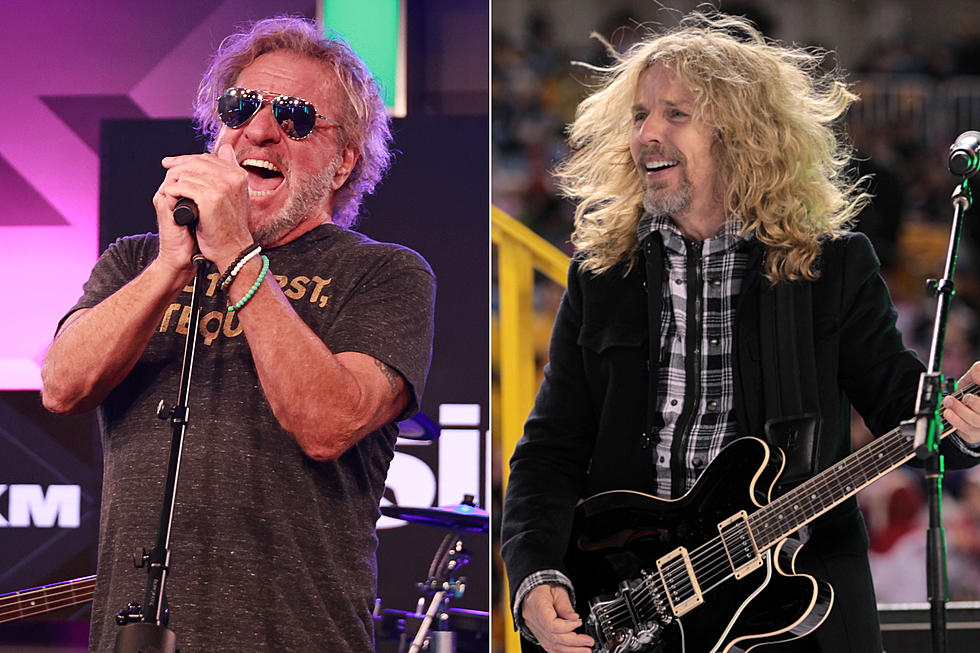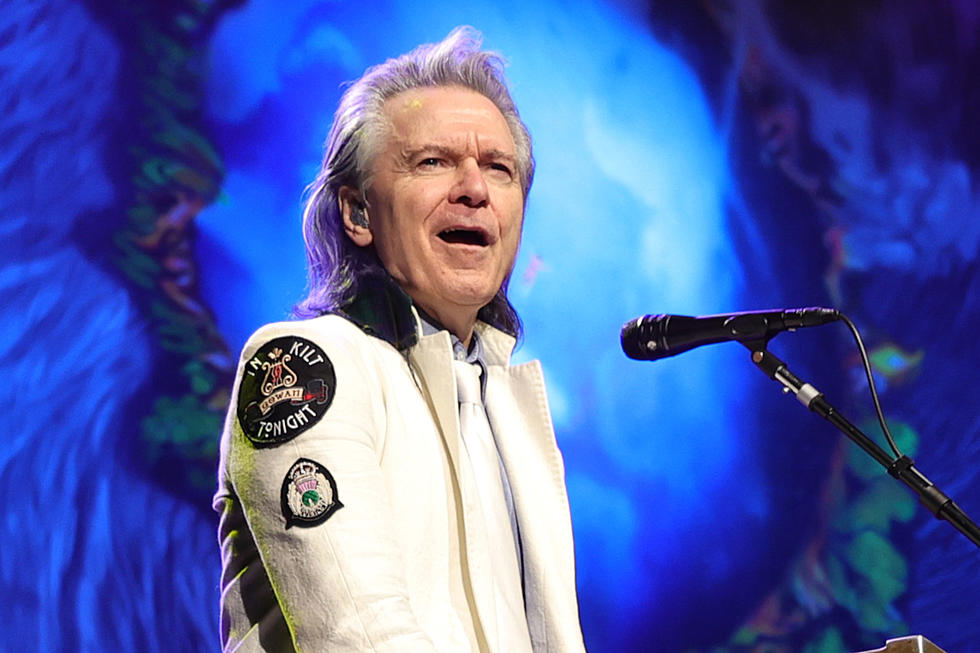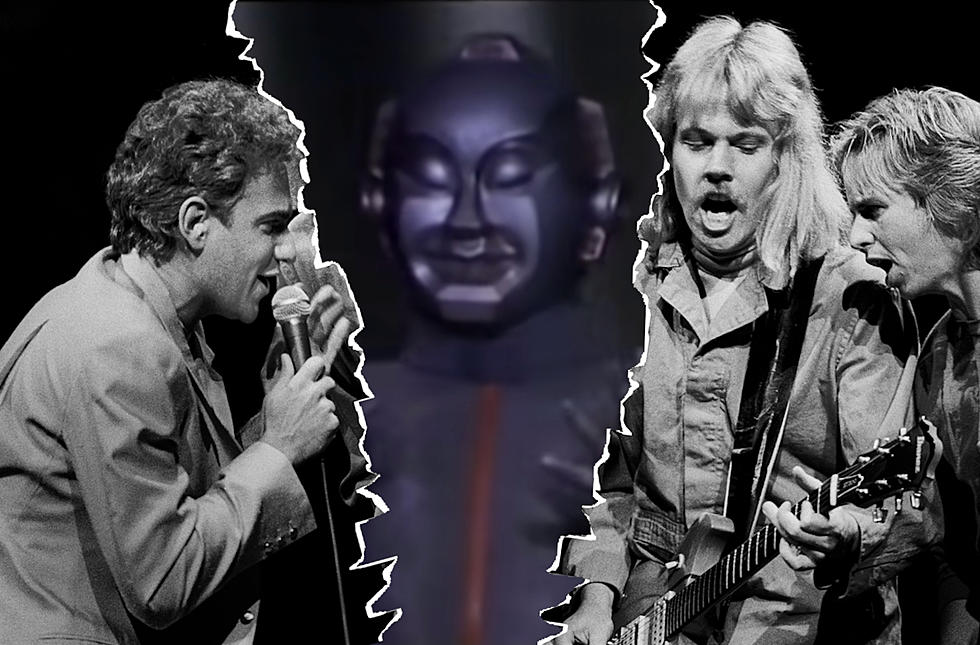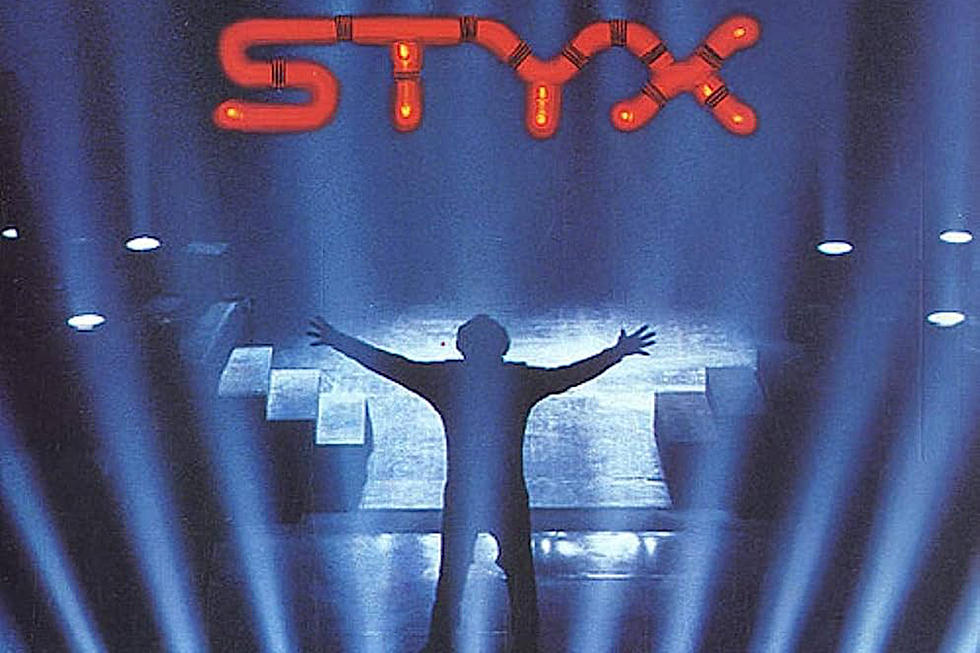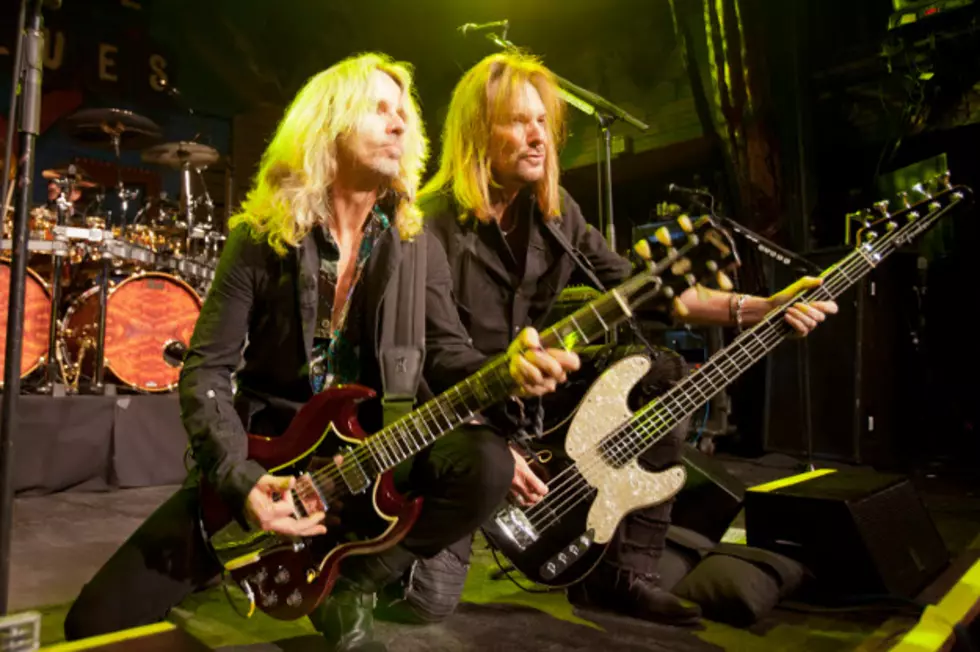
Styx Bassist Ricky Phillips Discusses New Tour and Playing With Ronnie Montrose
In the now familiar world of classic rock package tours, Styx have become the masters of the concept, touring nearly every summer with a revised approach that somehow never fails to feel fresh.
This summer, they’re on the road with their old friends REO Speedwagon. And although there’s a definite bond formed through the years of working together, the friendly rivalry between the two still fuels a drive for each to deliver the best show on a nightly basis.
So if we’re talking about competition, it certainly makes sense to add Ted Nugent to the equation. The Michigan-born rocker never met a challenge that he didn’t like -- and with the Nuge on board, you’ve got the third and final ingredient in this summer’s touring formula, which has been dubbed the Midwest Rock ‘N Roll Express and is very likely coming to a city near you.
We recently had the chance to speak with Styx bassist Ricky Phillips, who has been with the band for nearly a decade now. With almost 35 years on the road, including stints with The Babys, Montrose, Bad English and Coverdale/Page, Phillips is no stranger to the stage. As you’ll read, he's racked up his share of rock and roll war stories along the way.
Styx is one of those bands that you’re always working and now this summer, you’ve got the Midwest Rock ‘N Roll Express tour happening. What are fans going to see as this package hits their town?
I don’t think we even know, that’s probably the X factor there. Ted being on the bill brings a whole cool crazy wonderful element to it. Of course Tommy Shaw and Ted go way back to the Damn Yankees days, but at the same time, I was in Bad English and I had played and worked on a couple of Ted’s records. So I’ve always loved and admired Ted’s playing and [him] as a person.
He’s definitely the Motor City Madman, so hopefully, there’s been talk about him jumping up and doing something with us. We don’t know if it will be every night -- we don’t know where this thing is going to go. It’s going to be kind of like a wild stallion on the end of the range, but something is going to happen, I can guarantee it. I think that’s kind of the fun element of a tour like this, when you get people who have known each other for years, multiple things can happen from night to night.
You’ve got some past experience personally playing with Ted. What was a typical day in the studio like working on albums with him?
Well Ted’s a pretty good bass player himself, so when he called me, he had a song he’d written for a movie and then he had a single. He wanted me to play on those two songs, that’s how it started out. I can remember finishing a take and he loved it.
He was standing up in front of the speakers, pounding his fists going ‘that’s it, that’s it Rico, that’s what I wanted.’ And so I patted him on the back and I forget that he always has a gun stuck down the back of his pants, so I was just glad that the gun didn’t go off! But Ted’s very fun and up and an emotional guy and very into every moment of the day, he’s squeezing some juice out of it. He’s very....he’s on 10 or 11 at all times. It’s just a lot of energy.
This new Styx live release featuring full album performances of ‘The Grand Illusion’ and ‘Pieces of Eight’ is great. How daunting was it to tackle those two albums?
Man, I’ll tell you, I guess I had to put on my thinking cap and really, not just go in and dissect and learn these songs. Some of them had never been performed live by Styx, which I didn’t realize, in any formation from the beginning. There were certain songs that were never performed live.
Part of that was because there are some really complex vocals. But we tackled the vocals first and they sounded great, so we kept forging ahead and I think one of the things that you don’t think about...when you would make a record back in the day, when you wanted to get something to a program director, so that you assured yourself of getting airplay with a station, you would stack the front side of the record with your hits.
But live shows don’t go that way. You kind of ramp up to the big songs and you leave them with all of the big hits at the end. Well, making records is exactly the opposite. You’d start off with hit/hit/hit/hit and then it’s on to the album cuts. Most people who are big Styx fans are going to know those cuts, because they had those albums and they played them. But just for the general, the way you would sequence to create an energy flow through a live set, it almost worked against what you would traditionally do.
So we had to see how is that going to work? Because ‘Aku Aku,’ which is the very last song on ‘Pieces of Eight’ is a very mid-tempo to slow, almost a Pink Floydish song and it’s not the both guns blazing and fireworks going off that you’re used to at the end of a Styx show. So what we ended up doing was fading it out, just the way it is on the record. And as we faded out, our lighting director Libby Gray, she would dip the lights until the place was black and it was very effective. It was exactly the opposite of what you’d expect.
The very first night that we put that to the test, it was ‘oh boy, this better work!’ And it kind of goes down to complete silence and then the roar of applause [comes in]. It was pretty cool doing the whole thing. You’d take the intermission between the two albums to come back and treat them like the vinyl experience.
It starts off actually with the film as you know, of a young kid in the ‘70s grabbing those albums, pulling them out and putting it on the turntable and hearing that hit of the needle as it hits the vinyl. And then the lights would go on and we would start the show. It was very effective and very fun to do. We actually can’t wait to do it again. We will be doing it at some point I think, towards the end of this year again.
The same albums or something different?
Because we never were able to....we only did a short run off of basically east of the Mississippi, we never have done that set west of the Mississippi. We are going to try to do that at some point and get that together.
Highlighting those albums side by side, really revealed to me once again, the lost art of album sequencing. To imagine dropping the needle on the second side of ‘Pieces of Eight’ and hearing ‘Blue Collar Man’ come out, like, ‘what must that have been like’ is the thought that you have!
Yeah. And I remember with sequencing it was a big debate and sometimes, I don’t want to say “argument,” but everybody was very active in what they thought the beginning song of the B-side should be. Because you’ve gone through a movement, hopefully a good flow of music and then boom, you’ve got to start up again.
When somebody’s going to walk over to the turntable, which you don’t do anymore -- kids today don’t have any clue or idea what that’s even about unless they’ve gone and bought vinyl -- which it’s kind of cool to see people are doing that again. But that whole approach to, what should create this new energy now? After someone’s broken their concentration and the flow of music, now you walk over to turn the album over and put it down on the B-side. And what should start that energy flow again was a very, very active discussion with every band who went through that process.
I think the full album shows have been very interesting, because sometimes you see a band do it and you can see how awkward it is for them to play through the album with the original sequencing where maybe it doesn’t work as well in the live setting and you can see that they’re visibly uncomfortable. I thought that with these two albums, it was the opposite, both of these albums worked very well. Also, you could see how into it you guys were and the amount of work that had gone into it with the opening video, breaking the presentation up into the original album sides, etc. I thought it was all very cool.
Oh thanks, man. Well, you just said it. Once you’re doing it, you’ve got to commit to it 110 percent. Because if you start to feel any kind of lack of confidence or second guessing at all, it’s not going to work. Once we got in there, we said ‘man, we’re committed, let’s go for it. I think that’s what it takes just in general as far as performing goes in any situation is that once you’ve made up your mind to do something, commit to it and go for it, give it everything.
What was your perception of the band in the heyday? How much did you cross paths while doing your own touring in the ‘70s?
Well, just like everybody I think who is in a band, my focus is on my band. It was never in Styx when I was in the Babys or any other thing I was doing. But we would do gigs with them and I remember John Waite and I, the very first time we ever did shows with Styx, walking out and going ‘whoa!’ There was just something so different about the band, something so unique. The vocal approach was different.
The two guitar thing which was very apparent to us, I don’t hear it talked about a lot, but the whole thing of Tommy Shaw and James Young, stylistically very different from one another, but the two them created a sound that became....it wasn’t like Boston or Queen where it’s harmony guitars, it was a different approach. Two guitars playing something completely different but where they crossed over and the way they melodically created chord structures within different lines was a whole different approach.
I hear it every night now on and off the stage and it really is quite unique and I don’t think they ever sat down and said ‘well, this is what we’re trying to do.’ It’s just a result of the way Tommy Shaw and James Young play together, it’s just that cool thing. I remember Waite and I listening to what was going on and seeing the three lead singers - James Young, who has the tough rock and roll voice, Tommy Shaw with almost that blue-eyed soul sideline to the rock vocal and in those days, Dennis DeYoung, who had that piercing almost operatic tone.
The way they’ve carried on the three man frontman approach is just so cool and unique and being a part of it and singing with those guys night to night is a blast, because everybody is so strong from night to night. They are human, so there have been nights, but so few nights in the past eight and a half years I’ve been with the band that I’ve heard anybody even really falter. You wouldn’t know that they had a cold or could barely talk this afternoon. They go on that night and boom, they somehow, it comes off. It comes off and the voice comes back.
It’s a trip watching these guys and singing with them, because we’ll do four, five and six shows in a row. We did 18 shows in 21 days and nobody lost their voice.
Wow!
Yeah!
It’s a really well-oiled machine and I have to tell you, looking at the ‘Regeneration’ album project that the band did in the past few years, I was floored to see the liner notes and realize that you had each recorded your parts in separate locations. But you don’t hear that in the final recordings, it really sounds fused and fully formed. What was it like putting that together?
Well we wanted to do it and I think the big tough pill to swallow for us, but we did and we did it years back, was that this is no longer the recording industry. For us, you have to figure it out. It is the touring industry and if you’re fortunate enough to be able to have a following, to be able to tour, that’s what’s your bread and butter. That’s what feeds your crew’s families and feeds you and your family.
So in doing that, we try to figure out a way -- how can we keep recording and how can we keep creating and writing new music and doing things like the CDs that you’re talking about affordably? We all have our own studios and so we decided man, we breathe with each other. We do so many shows, we really know what the other person is like. So we thought, let’s try this and see if it works. We thought it would in theory but you never know until you put it to the test. So Todd [Sucherman] would do drum tracks to whatever it was we were working on and send them over to me and I’d load them up into my studio.
And having worked so much [together], basically Todd and I are able to create rhythm beds to the songs that have emotion and give a vibe so that when we farm it off to Tommy, J.Y and Lawrence [Gowan], there is something already that’s there that is some glue and foundation to work with. And a couple of times I remember -- the very first time we tried it, I had a tuner that it was just a few cents off. So when we started going through the process, I had to redo all of my bass parts.
There is a learning curve in all of this and there are things that do happen and did happen. But once we sorted little funny technical things out, we were able to focus in and resurrect that feeling that we get on stage together each night.
Part of that I think is when I hear the tones, if there’s something that there’s already guitars on, I don’t know, it just brings those performances. Those hundreds of performances that we’ve done together [come] to mind and you just focus and you go and you’re vibing with the guys, whether they’re standing there in front of you or not. I am a big fan of everybody recording at the same time in the same room together, don’t get me wrong. This is the way we figured out how to make this work so we could actually keep bringing out music.
This year, we unfortunately lost Ronnie Montrose. You were very close with him.
Ronnie was just such a dear, wonderful friend, good guy and an incredible musician who I always thought was one of those....I shouldn’t say unsung heroes, because he was admired by many. But [he] was one of the originators of certain guitar riffs that other guys have picked up on and used in their arsenals for the last 40 years.
Player to player, what would you say that you gleaned from Ronnie?
The one cool thing about working with Ronnie was that no two nights were the same. We would play and stay within the moment and feed off of each other and if the song needed to extend and go an extra how many ever bars until we played out whatever we were vibing against each other at that moment, that’s what the audience saw and that’s what we got to do.
I did have a fortunate thing -- Ronnie and myself and Eric Singer, just the three of us, went into a studio, two inch tape, no digital anything, live takes, mistakes and all, whatever came out went down, there were no retakes. We did 10 songs that we recorded that’s actually in the can. I’m hoping someday it will see the light of day.
We did 10 songs and Ronnie decided he wanted to call it “10 by 10.” In other words, it was the three of us as the main focus as the rhythm section creating the music. It was 10 different singers.
Tommy Shaw and I finished one of the songs, Sammy Hagar did one, Edgar Winter did one, Mark Farner did one, [former Journey vocalist/keyboardist] Gregg Rolie did one -- basically 10 different singers. I’m just so sorry that ….if it does see the light of day at some point and we’re talking about trying to make that a reality, that Ronnie wasn’t able to see the final product, because he was so into it and so happy about the rawness and the roughness.
Ronnie could do that, because he played so exact and precise and his rhythm chops, the timing, were so impeccable, that we just had to hang on tight and follow Ronnie, wherever he was leading us. It was one hell of a musical experience for me.
Wow, that’s an amazing lineup on those tracks.
Yeah, I really hope that we can somehow...the problem with it is that it’s been in the can for a number of years now and we were kind of just waiting for Ronnie’s health to get to the point where he was in the frame of mind to do the solos and that’s basically what is missing from the project.
Well sometimes that can be fun, getting the guitar players and certainly, you’ve worked with a few yourself. Getting the guitar players to come in and play those solos could be fun.
Yeah, we’re bantering all of that about right now, how we’re going to address that. We just want to make sure Ronnie’s well represented and it’s done the way he would want it done. That’s the whole focus. Not the way we want it done, but the way he would have had it done.
Talking a bit about your time with the Babys, one of the quotes I saw from John Waite was “we were better than people thought we were.” You guys certainly had chart success, but it seems like commercially, it was regarded as somewhat of a failure. The band certainly had the live show and the songs, what do you think it was that kept the Babys from going “big time?”
That’s a really interesting question. Because the Babys, when we were over and we’d all decided to throw it in, it was more or less out of frustration because we saw that we only sold records while we were touring. People would see us and then they’d go ‘oh my gosh, I want to go buy that record.’ You could chart our record sales by what city we were in and which way we were moving in the country and that’s where we’ve sold records. So being out on the road is where we had to be to sell records.
For some reason, the job wasn’t getting done by the record company. We were certainly getting airplay, so you would think that would be enough, but it was just one of those anomalies. It wasn’t working like it was for other bands. And it was frustrating. Bands loved touring with us -- for a while there, we were the opening act for everybody. For Journey, for Styx, for AC/DC, for Cheap Trick, for whoever it was and we were trying to get ourselves in that top slot. And we did in a few markets -- I remember we were able to play Cobo Hall in Detroit.
But as far as doing a big tour as the headliner, we just were falling short and we were wearing ourselves out trying to push that ball uphill. So after the Babys split up and I started doing side work on tours as a live side player, I would meet these record company presents from other labels who would say ‘oh man, you were my wife’s favorite band -- you were one record away from being huge!’
Every time I would hear that, I would cringe, because it was probably true, but we just didn’t make it to that next record. And then I saw a lot of those songs that would have been on the next record on Journey’s next record and that was the biggest record I think they ever did. Jonathan Cain, a huge writing force with us at that point -- a lot of those big Journey songs would have been on the next Babys record. Which coupled with my songs and John Waite’s songs, it would have been a different flavor, a different taste, but who knows? We’ll never know.
What were some of those songs that you heard in the Babys that eventually became Journey songs after the band broke up?
Um, well I know, all of the songs, like ‘Separate Ways’.....not ‘Faithfully’ -- that didn’t come until later on. I’m trying to remember what the songs were -- I’m not sure they had titles at the time, because it was more music than finished songs. And of course Steve Perry came along with some great melodies and some influence on those songs. They would have taken a whole different direction had they become Babys songs. But the point was that Jonathan had already been writing some really great material that was at that point, ready to go.
From the Babys side of things, do you think you later got a little bit of redemption with the success that you had with that first Bad English album?
I think so. I don’t know if we thought about it that way at the time. I think we were fighting what was going on in the ‘80s more than anything. And when I say “fighting,” it’s just for us, wearing spandex pants and having big hairdos -- every band did it, because if you wanted to get on MTV, you had to have the look of the day, but there was a reason that the ‘80s kind of imploded upon itself. Every band became interchangeable and to get on the radio you had to have a certain kind of sound and there was no uniqueness like there was say, in the ‘70s, anymore. Everybody was homogenized into one [type of sound].
We were a little bit frustrated with that. When we started off, we were not at all intending to go in that direction. But once you get started and you get the record company coming back to you going ‘we gotta have something to play on the radio.’ It’s a matter of survival and yes, we did have number one MTV videos and yes we did have a number one song with with ‘When I See You Smile,’ but ‘When I See You Smile’ had very little to do with what the band was all about.
And it wasn’t just us, it happened with a lot of bands and then all of the sudden, there was nothing unique anymore and that whole ‘80s sound imploded upon itself and music changed, which I guess people say grunge came in and that’s what it was. But I think it was the culmination of a lot of things.
Maybe not that first album cover, but I think when you listen to those two albums that you did with Bad English, they really do hold up. Some albums from the period sound pretty ridiculous now, but those still stand up when you listen to them.
Oh thanks, man. We definitely were very serious -- we wanted to make good records and we worked so hard, I will say. We would go into my studio and demo stuff, we would go into Jonathan’s studio and demo stuff. We definitely made sure that by the time we went into the recording studio, all of the arrangements were right -- the lyrics and melodies, we really, really worked hard on those records, so I appreciate hearing that.
It seems like things imploded for the band after that second album was completed. But artistically, did it feel like you guys had captured the album that you wanted to do to follow up the success that was that first album?
I think so and when I listen to it, I’m really proud of that second record. Because it’s dark, but with a cool vibe. It’s not dark like it’s depressing, it’s just darker. They’re not all the obvious ‘80s sounding hit type things, it was more or less a reflection of what was going on within the band, which had musically to me, my favorite sort of sound. It had great dimension to it. I love that second record and I wish that it would have had a proper release.
We kind of split up during the mixing process of it, so it sort of got shelved. There is a song that John and I wrote called ‘Time Stood Still’ that did get released [as a single] and was a number one song in Europe. But in the States, it never really got its due.
‘Time Stood Still’ was the song I was going to mention specifically. That song is really to me a good example of John’s ability to deliver a certain lyric and make it memorable.
Oh yeah. You got that right. When we were writing that song, we actually went over to work with a friend of mine named Jesse Harms, a great songwriter. Jesse was actually my roommate and had moved in with me in Los Angeles while he was down there writing for a while. I took John over to work with Jesse and he had a song and it just wasn’t right for us. And just to kind of save the day I said ‘c’mon, Jesse, do you have anything else?’ And he had this title, ‘Time Stood Still,’ and he had some chords and I picked up the guitar and started playing and the next thing I know, John’s got a microphone and he starts spinning this story.
He said “we found a seaside bar/high above the rocks” and then I came in with “you were drinking white wine/and I was doing shots” and boom, this story just began and that was the best meat of what I delivered, because the rest of it is pure John Waite.
He began to weave this story and I couldn’t wait until we’d finished writing the song, because I wanted to know how the song ended. And each line got better and better and better. You’re right, John has an incredible unique style of writing and when it hits on all marks like that one does, it’s something special to behold.
Styx, REO Speedwagon and Ted Nugent are on the road with the 'Midwest Rock 'N Roll Express' tour. Check out a list of upcoming tour dates and find out when they'll be in your zip code.
More From Ultimate Classic Rock



